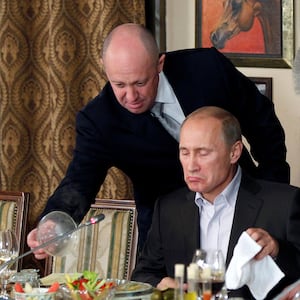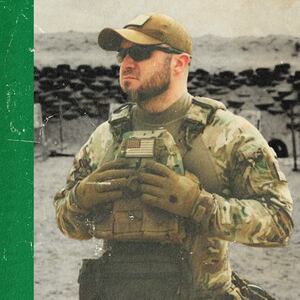The Kremlin has caved to Wagner Group boss Yevgeny Prigozhin and said criminal charges against him for his attempted military coup will be dropped.
Vladimir Putin’s spokesman, Dmitry Peskov, announced the news Saturday in comments to the TASS news agency, claiming Prigozhin will be leaving the country soon and going to Belarus.
He said he had no idea what Prigozhin will do in Belarus. The relocation was apparently part of the deal Prigozhin brokered with Belarus President Alexander Lukashenko in order to halt Wagner’s advance on Moscow. Putin gave his “word” that Prigozhin will be allowed to leave for Belarus, Peskov said.
The Kremlin also said all Wagnerites who took part in the uprising will be spared from criminal charges.
The latest development came after Prigozhin abruptly announced that he was ready to turn his forces back around from a march towards Moscow and call off the mutiny.
“We turning our columns around and going back in the other direction toward our field camps, in accordance with the plan,” he said in a message on Telegram.
The news came after the Belarusian government claimed President Alexander Lukashenko had reached a deal with Prigozhin to halt the advance.
“This morning, Russian President Vladimir Putin briefed his Belarusian counterpart on the situation in southern Russia with the private military company Wagner,” the statement said. “The heads of state agreed on joint actions.”
“As a follow-up to the agreements, the President of Belarus, having being additionally informed on the situation through his own channels, and in agreement with the President of Russia, held talks with the head of Wagner PMC Yevgeny Prigozhin,” the statement continued. “Yevgeny Prigozhin accepted the proposal of the President of Belarus Alexander Lukashenko to stop the movement of armed persons of the Wagner company on the territory of Russia and take further steps to de-escalate tensions.”
It is unclear at this stage what the Russian President conceded to strike the deal with Prigozhin.
Mykhailo Podolyak, an adviser to Ukrainian President Volodymyr Zelensky, wrote on Twitter that the retreat was a strange decision. “You almost nullified Putin, took control of the central authorities, reached Moscow and suddenly... you retreat. Because one very specific intermediary with a dubious reputation (#Lukashenko) promised security guarantees from the person (#Putin) who ordered to destroy you in the morning. Although not without benefit: #Prigozhin humiliated Putin/the state and showed that there is no longer a monopoly on violence...”
It came after Moscow Mayor Sergey Sobyanin ordered residents to stay inside as Putin told Russia about an “armed mutiny” led by former confidante Prigozhin and his Wagner mercenaries advancing on the city.
Sobyanin had announced on Telegram that Monday would be a “non-working day”, except for security services and other authorities, amid what he called a “counter-terrorist operation.”
“I ask you to refrain from traveling around the city as much as possible,” Sobyanin wrote. Authorities are on “high alert,” he added, describing the situation in Moscow as “difficult.”
After the announcement, Telegram was reported to be facing technical difficulties. “Some of our users in Europe have been experiencing connection issues for the past 10 minutes,” the app shared on Twitter.
Residents of Moscow were urged to remain indoors and stay home from work on Monday .
Earlier on Saturday, Putin conceded that the insurrection meant his regime was up against “the toughest battle for its future.”
Before the speech played out, Wagner mercenaries were seen descending with no resistance on Rostov-on-Don, Russia’s southern military HQ, which has been co-ordinating the invasion of Ukraine. Once inside the key command center, Prigozhin recorded a message saying it was under his control.
This insurrection, which began after Prigozhin claimed his men had been struck by a missile fired by the Russian military, is the clearest threat to Putin’s power since he assumed the presidency in 2000.
In the wake of this news, United States Secretary of State Antony Blinken said that he had spoken to the G7 Foreign Ministers, as well as Joseph Borrell, the high representative of the European Union for foreign affairs and security policy.
“The United States will stay in close coordination with Allies and partners as the situation continues,” the Secretary of State tweeted Saturday morning.
Turkish President Recep Tayyip Erdogan also called Moscow on Saturday. Erdogan showed his support for Putin, Kremlin’s information service reported on Saturday.
Erdogan “expressed full support for the steps taken by Russian leadership,” the Kremlin said in a statement.
Putin said he had already issued the order for the military to respond to the organizers of the uprising with “harsh measures.”
“All those who deliberately set out on the path of betrayal will suffer inevitable punishment,” he said.
Unconfirmed social media footage showed an apparent explosion at an oil depot in Vorenezh and a possible missile strike on a Wagner column headed for Moscow.
Prigozhin boasted that Russian citizens were backing his march towards Moscow, during which he said Wagner had not attacked any of Russian soldiers. “Why is the country supporting us? Because we walked on the march of justice, and they hit us, first with artillery then aviation,” he said. “And we marched on without a single shot, we didn’t touch a single conscript.”
Britain’s Defence Intelligence agency said Wagner units were moving north through Vorenezh Oblast in the direction of Moscow. “With very limited evidence of fighting between Wagner and Russian security forces some have likely remained passive, acquiescing to Wagner,” the intel report said. “This represents the most significant challenge to the Russian state in recent times.”
Ukraine’s Main Intelligence Directorate claimed that it had seen evidence that Moscow was preparing for a siege of the Russian capital.
For the first time since the splits between Wagner and the Russian Defense Ministry bubbled to the surface, Prigozhin called out Putin directly on Saturday.
Responding to the president’s address, he shot down the Kremlin’s authority.
“No one is going to turn himself in at the request of the president, the FSB or someone else, no one wants to continue to live in corruption and deceit,” he said. “Those who oppose us are those who have gathered around the scum.”
The scale of the fear within Moscow’s elite was captured by the Kremlin’s number one propagandist Vladimir Solovyov who recorded a video of himself racing back to Russia from Ukraine. “I wasn’t expecting to live to see this kind of thing. Our country is at war,” he said.
Looking for historical parallels, he cited the revolt which led to Russia’s 1917 revolution and Mussolini’s successful coup d’état, the March on Rome.
“Are we really going to allow civil strife now and lose our country?” he asked. “There is nothing more frightening than civil war.”
After months of feuding between the mercenary boss and Russia’s Defense Ministry, things came to a head on Friday night when Prigozhin accused the Russian military of ordering a rocket strike on a camp full of his men, and vowed merciless revenge.
Prigozhin said he was “ready to die” along with 25,000 fighters prepared to stage a mutiny and stop the “evil” leading the failed war effort in Ukraine.
Within hours, the Prosecutor General’s Office announced charges against Prigozhin for attempting to incite an armed rebellion, a crime that carries a maximum penalty of 20 years behind bars. Top Russian military brass released video appeals calling on Prigozhin to surrender, or for his own men to detain him and hand him over. State-run media aired an emergency broadcast relaying the same message.
But Prigozhin showed no sign of backing down, instead releasing a series of audio messages via his press service in which he accused the Defense Ministry of deploying fighter jets to shoot at Wagner vehicles in the Rostov region and of firing at civilians on Russian territory.
“If someone gets in the way, we will destroy everything that gets in the way. We reach out a hand to everyone, no need to spit in that hand. We are going all the way,” he said, later adding: “We’re all ready to die, all 25,000! And then there will be another 25,000!”
Local media reported checkpoints being set up late Friday night on a highway that leads from Rostov-on-Don to Moscow, and the territory around the Kremlin was reportedly closed off to visitors for the foreseeable future. Moscow Mayor Sergei Sobyanin said “anti-terrorism measures” were being carried out to boost security in the capital, while residents in the Rostov region were urged by the governor to stay at home.
In a fiery voice memo, Prigozhin claimed to have lost a “huge” number of soldiers in the rocket strike at a Wagner camp—an attack Moscow denies orchestrating.

Yevgeny Prigozhin at a recent funeral in Moscow.
Reuters/Yulia MorozovaPrigozhin said, “Those who destroyed our lads, who destroyed the lives of many tens of thousands of Russian soldiers, will be punished. I ask that no one offer resistance.”
Russia’s Defense Ministry said Prigozhin’s claims “do not correspond to reality and are an informational provocation.”
It’s unclear what the internal ructions mean for fighting on the ground in Ukraine, which has already become rife with infighting between Russian soldiers and Wagner mercenaries. Just last week, Prigozhin vowed to defy an order from Russia’s Defense Ministry to fall under the regular army’s command, saying he’d instead take defectors under his wing and create his own ranks.
Prigozhin said Friday that his “march for justice” will not impede the operations of Russian military troops in Ukraine, but Wagner fighters have been integral to Russian advances—and alleged atrocities—on the front lines.
The mercenary leader escalated his defiance on Friday, asserting that military leaders were “deceiving the public and the president” about why a war with Ukraine was necessary in the first place. He accused military leaders of fear-mongering about a potential Ukrainian invasion that was never coming to justify launching an invasion of their own.
Referring to Russian Defense Minister Sergei Shoigu by name, Prigozhin said Russia invaded Ukraine “for the self-promotion of a bunch of bastards.” He added that the operation was poorly planned and “embarrassing.”
“Shoigu killed thousands of the most combat-ready Russian soldiers in the first days of the war,” Prigozhin said. “The mentally ill scumbags decided, ‘It’s OK, we’ll throw in a few thousand more Russian men as ‘cannon fodder. They’ll die under artillery fire, but we’ll get what we want.’”
While the drama between Moscow and Prigozhin played out, Ukrainian officials announced Friday their forces had retaken eight villages from Russian control as part of their first counteroffensive. Top Ukrainian officials conceded this week that gains have been slow, but indicated the attack’s main push is yet to come.
“The counteroffensive is not a new season of a Netflix show,” presidential adviser Mykhailo Podolyak posted to Twitter. “There is no need to expect action and buy popcorn. Offensive operations of the Armed Forces of Ukraine continue in a number of areas. Formation operations are underway to set up the battlefield. Time is always important… especially in war.”
Hanna Maliar, a deputy defense minister, reportedly said on Ukrainian TV on Friday that the “main blow is still to come.”
If the Russian army is focused elsewhere that can only help Ukraine’s push.










